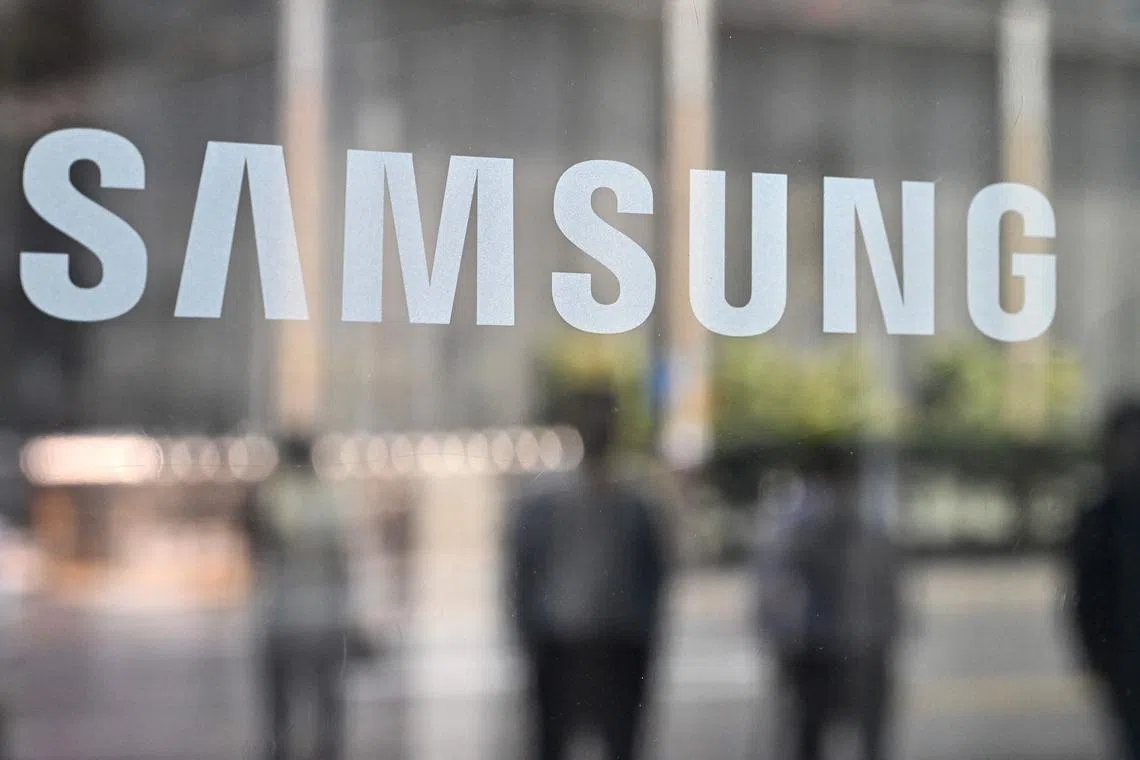Samsung hit by historic profit plunge as demand for chips, electronics falls
Sign up now: Get ST's newsletters delivered to your inbox

Samsung is slated to provide a full financial statement with net income and information on divisional performance on Jan 31.
PHOTO: AFP
SEOUL – Samsung Electronics’ profit has dropped by the most in over a decade, in a sign that the global economic slowdown may be hurting electronics demand even more than anticipated.
South Korea’s largest company has been grappling with weak demand for memory chips, smartphones and displays as consumers tamp down holiday spending amid soaring interest rates and inflation. Adding to demand woes, Apple, one of Samsung’s biggest customers for displays and memory chips, suffered production delays at its iPhone assembly complex in the Chinese city of Zhengzhou.
Flash memory chips are now at price levels matching Samsung’s cost of production, Citigroup analyst Peter Lee said in a note prior to the announcement.
Samsung’s operating profit fell by 69 per cent to 4.3 trillion won (S$4.6 billion) for the three months ended December, missing the average estimate of 6.7 trillion won by analysts. Sales fell to 70 trillion won. Samsung is slated to provide a full financial statement with net income and information on divisional performance on Jan 31.
The grim preliminary numbers are adding pressure on Samsung, the world’s largest memory chipmaker, to shift gears and lower output and capital expenditure (capex), fuelling hopes for a turnaround.
Samsung shares gained about 1 per cent on Friday morning after swinging between gains and losses at the market open. Rival SK Hynix also climbed about 1 per cent, while South Korean chip suppliers jumped.
”Samsung has been adamant that it has no plans to cut capex or supply, but fast deterioration in demand and deteriorating profitability mean that management might be forced to consider the unthinkable, that is, memory production cuts,” said CLSA Securities analyst Sanjeev Rana.
After ramping up production to record levels to meet a pandemic-era surge in demand, chipmakers have since had to slash spending on new production and cut costs to cope.
Memory chipmakers including Micron Technology have said they do not expect a recovery until the second half of this year and have lowered budgets for new equipment and plants and cut costs. Micron further warned that it would be difficult to return to profitability this year, announcing a 10 per cent reduction to its workforce, as well as more cuts in capex. SK Hynix has said that it will cut its capex in half for 2023.
Samsung has previously said it has no immediate plans to cut output. Since then, however, memory chip price falls have accelerated as competition intensified over clients.
“The decline in fourth-quarter demand was greater than expected as customers adjusted inventories in their effort to further tighten finances,” Samsung said in its statement. The company saw greater-than-expected price declines in memory and added that “smartphone sales and revenue decreased due to weak demand resulting from prolonged macro issues”.
The crisis in the memory chip market has been further exacerbated by United States sanctions on some chip-related exports to China, hurting demand from some of Samsung’s key clients. Chip sales in South Korea – a bellwether for global tech demand – fell 29 per cent from the previous year in December, in the fifth consecutive monthly drop and on the heels of the biggest year-on-year decline since 2009 in November.
In contrast to its rivals, Samsung has been lifting memory production in terms of storage capacity, which grew by roughly 10 per cent in the last three months of the year, even as Samsung’s average selling prices slumped about 28 per cent, according to an investment note dated Dec 22 by eBest Investment & Securities. BLOOMBERG


